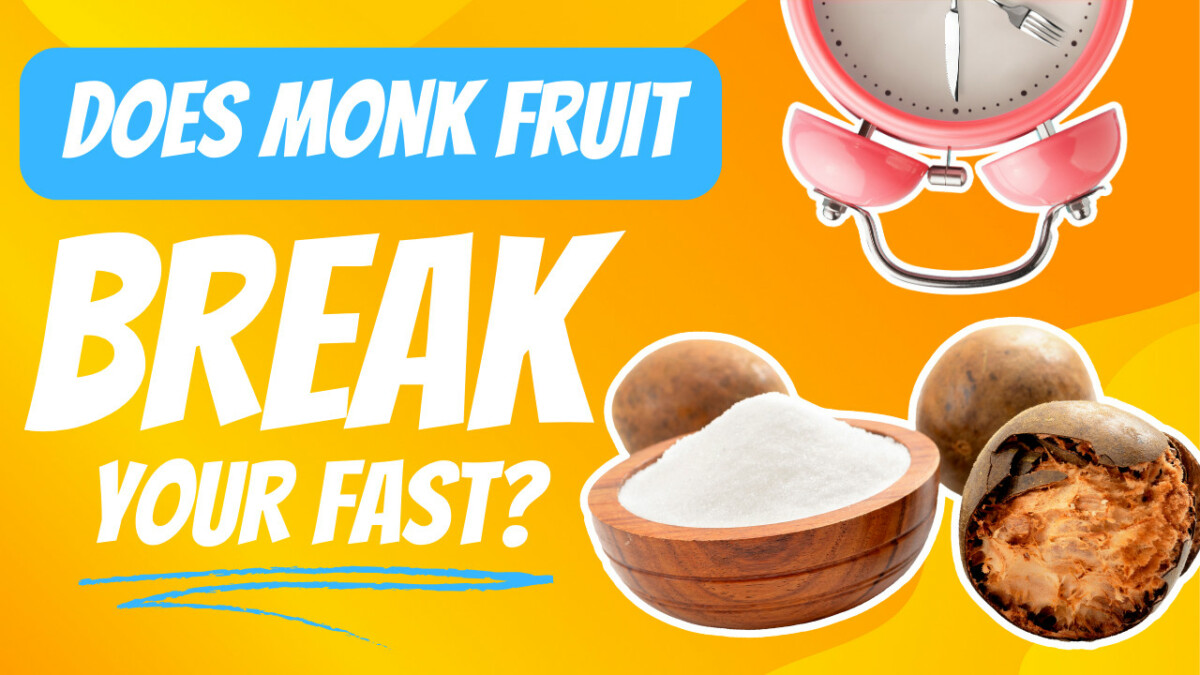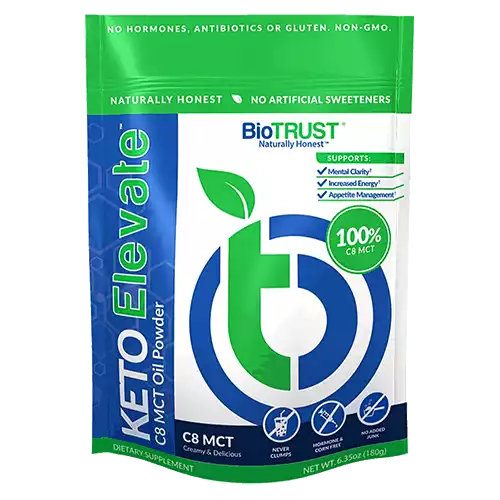Will eating the natural sweetener monk fruit break your intermittent fasting period, or is it totally fine?
Monk fruit is a zero-calorie sweetener from a plant that promises to replace sugar while not spiking blood sugar or insulin. But how does monk fruit interact with your intermittent fasting routine, and does it break your fast?
Being able to have some sweeteners like monk fruit during your fasting period will make it much easier. But the last thing you want to do is unknowingly break your fast by eating something you weren’t supposed to.
Some sweeteners will break your fast, while others are safe. Finding the right information on the Internet can be confusing when everything seems so conflicting. But here, you’ll find a science-backed answer, so keep reading to discover the final verdict on monk fruit and fasting.
Can You Have Monk Fruit Sweetener While Fasting
Quick Answer:
Monk fruit sweetener contains zero calories, doesn’t spike your blood sugar or insulin, so it will not break your fast. Unless you’re following a pure water fast, you’ll be safe having some monk fruit sweetener during your fasting period.
Monk fruit sweetener, stevia, and allulose are natural sweeteners at the top of my approved sweetener substitute list. Monk fruit doesn’t inhibit your intermittent fasting routine since it doesn’t contain any calories. It also shouldn’t spike your blood sugar or cause an insulin response.
Monk fruit sweetener is a natural sweetener that contains the antioxidant mogrosides. This natural yet powerful antioxidant can help fight damage-causing free radicals, reducing body inflammation.1 Monk fruit doesn’t affect the AMPK pathway, so it should also improve autophagy.2
The goal of intermittent fasting is to keep your insulin as low as possible. Since monk fruit sweetener doesn’t contain any calories or sugar then it won’t spike your blood sugar. Therefore you don’t have to worry about your fasting being negatively impacted by monk fruit.
But you also have to check the nutrition facts label to see if your monk fruit sweetener contains any other ingredients. Many can also contain added ingredients that could interact with monk fruit and impact your fasting.
Coffee With Monk Fruit When Fasting
Most start their fasting period after dinner, then sleep, and continue fasting throughout the next morning. For many, being able to drink coffee with a sweetener is a must. Not having any sugar or sweetener in your coffee can be the hardest part of fasting.
The good news is drinking coffee can enhance and accelerate your fasting results. Coffee contains caffeine which is a natural thermogenic that will help get your metabolism going.3 Drinking coffee when fasting can also give you an energy boost while curbing hunger.4
I know most people don’t like to drink plain black coffee. Yet, adding sugar to your coffee will definitely break your fast. The good news is that you can add a serving or two of a monk fruit sweetener to your morning coffee without fear of breaking your fast.

Many monk fruit sweeteners also contain erythritol. Erythritol is a sugar alcohol that also has zero calories and shouldn’t break your fast since it doesn’t spike insulin. The reason so many monk fruit sweeteners contain erythritol is to make it taste like regular sugar.
Monk fruit is 200-300 times sweeter than sugar. So, to even it out, monk fruit is usually mixed with erythritol, which is only about 70% as sweet as sugar. Without the erythritol, the sweetener would just be way too sweet.
But if you’re fasting for gut health and digestive system rest, then you may want to reconsider monk fruit sweeteners with erythritol. Some people can experience digestive upset, such as gas, bloating, and loose stools when taking sugar alcohols like erythritol.5
Monk Fruit and Ketosis
Many do intermittent fasting for weight loss purposes. One of the main benefits of fasting for weight loss is it’ll put your body into a state of ketosis. So, maximizing ketosis while fasting will speed up your fasting results even more.
Ketosis is when your body “switches over” from using quick-burning sugars and carbs you’ve eaten for energy to fat stores. Your fat stores are broken down into ketones, which your body uses as energy sources. This body process called ketosis results in fat and weight loss.6
To break ketosis, you’ll have to consume enough sugars and carbs to spike your blood sugar and thus cause an insulin response. Monk fruit sweeteners do not contain any sugars or carbs, so they shouldn’t cause an insulin response that’ll break ketosis.
But keep in mind that there is a belief that anything so sweet could cause a cephalic response in your body.7 This complex reaction could signal your body to release insulin in response to consuming something so sweet. This anticipation response by the body prepares the body for digestion despite zero calories coming in from the artificial sweetener.
Yet, this cephalic response might not happen at all with you and probably varies depending on the individual. It’s most likely such a small response that it doesn’t break your fast or kick you out of ketosis.
To really amp up the ketosis when fasting, consume C8-MCTs. This special form of MCTs are quickly converted into ketones via your liver. This helps kickstart the metabolic switch to start using ketones from fat stores for energy.8 I add some C8-MCT keto coffee creamer to my morning coffee every day for this reason.
Support Many of the Keto Benefits Associated With Increased Ketones, & Support Them FAST, but Without the Difficulty of Doing Keto...
Increase Ketone Levels Inside Your Body to Boost Metabolism, Elevate Energy & Enhance Mental Focus
- 3X Better Than Coconut Oil, Butter or MCTs
- Heightened energy levels
- Reduced cravings & appetite
- Graceful aging
- Healthy metabolism
- Increased mental clarity & focus
- Heightened physical performance and recovery
Monk Fruit and Autophagy
So, now that the question of whether monk fruit breaks a fast has been answered, what about autophagy? Autophagy is your body’s natural recycling process that eliminates old damaged cells. With intermittent fasting and autophagy, your body will be better at fighting off and preventing diseases while slowing down aging.9
AMPK (AMP-activated protein kinase) is an energy manager for your cells that plays a vital role in autophagy and fasting. When your cells are low on energy from fasting, AMPK is then activated to make more energy.10
AMPK is like a switch that turns on your cell’s internal recycling program (autophagy). So the more AMPK is going on in your body from fasting, then the more autophagy you’ll have too.
The good news is that monk fruit shouldn’t negatively impact AMPK, so it shouldn’t break autophagy. In fact, the antioxidant properties in monk fruit actually activate AMPK, so consuming it could enhance autophagy.11
Side Effects of Monk Fruit

What are the side effects of monk fruit? The good news is that monk fruit itself has no known side effects.
Monk fruit itself shouldn’t affect your digestion since it’s not absorbed in the upper gastrointestinal tract. It goes right through your body until it reaches your colon. So if you’re looking for a natural sweetener that won’t hurt your digestion, then consider monk fruit.
There’s also no evidence that monk fruit could alter your gut bacteria. While there is some evidence that other artificial sweeteners like sucralose and aspartame could negatively impact gut bacteria, there isn’t any for monk fruit. There is a study finding monk fruit could have prebiotic benefits to gut health.12
It’s perfectly safe to have monk fruit every day in moderation. Of course, too much of anything isn’t great for you, so be sure to consume it in moderate amounts. Monk fruit has no sugar, so it shouldn’t raise blood sugar levels.
But many monk fruit sweeteners can contain the sugar alcohol erythritol mixed in. Erythritol could upset your stomach, so you may want to find pure monk fruit extract drops. The powders are usually mixed with erythritol, and if it causes concern, then I’d go with the pure monk fruit extract drops instead.
What Sweeteners Don’t Break a Fast
As long as the sweetener doesn’t contain calories, sugars, or carbs, then you shouldn’t worry about it breaking your fast.
The best sugar substitutes when fasting are:
- stevia
- monk fruit
- allulose
- sugar alcohols
Artificial sweeteners like sucralose and aspartame also technically shouldn’t break your fast, but they aren’t the best choices. Since they’re significantly higher in sweetness (sucralose is 600x sweeter than sugar), they could cause an insulin response despite having zero calories.
Then you have to consider that artificial sweeteners like sucralose are also chemically made and aren’t natural sugar substitutes like stevia and monk fruit. There is some evidence that chemical artificial sweeteners could cause weight gain, digestive upset, and other health problems.13,14 Research is ongoing, but overall it’s probably better for your health to consume natural sweeteners like stevia and monk fruit instead.
However, many believe artificial sweeteners can still be used when fasting if you’re used to taking them. Your body can adapt and not cause an anticipatory insulin release. This likely depends on the individual, but if adding an artificial sweetener helps you keep fasting for longer, then you’ll most likely be fine without it breaking your fast.
Summary
Consuming monk fruit does not break a fast as long as you are not following a pure water fasting routine.
With pure water fasting, anything other than water, including black coffee, will break the water fast. Water fasting will most likely give better results, but it isn’t easy to keep up with in the long run since you’ll be depriving yourself of too much.
But if adding a little sweetener like monk fruit makes you more likely to continue fasting, then go for it. Compliance can be challenging for many, so if adding some monk fruit to your morning coffee keeps you fasting, then you’ll win in the end.
Taking a sugar substitute like monk fruit while fasting will help you lose weight and burn fat much better than table sugar. You’ll keep your body in a fasted state, while the sweet taste will also satisfy sugar cravings.
And if this makes it more likely you’ll keep fasting, then the better you’ll be in the long run.
Monk fruit shouldn’t break ketosis and can even enhance autophagy when fasting. If you have a sweet tooth, then feel free to add some monk fruit to your morning coffee guilt-free. So, all in all, monk fruit is a terrific choice for a healthy sugar substitute in your morning coffee that won’t break your fast.
Josh holds a Bachelor’s degree in Exercise Physiology and Nutrition Science. He’s a Certified Strength and Conditioning Specialist (CSCS) by the National Strength and Conditioning Association and he’s a Certified Personal Trainer (CPT) by American Council on Exercise. He’s worked as a Strength and Conditioning Coach at the high school and college levels. He has over 15 years of experience as a personal trainer and nutrition coach. He strives to bring inspiration and results for people to live healthier lives through smart diet and exercise.









